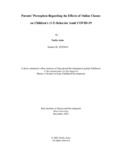| dc.contributor.advisor | Islam, Syeda Fareha Shaheeda | |
| dc.contributor.author | Azim, Tasfia | |
| dc.date.accessioned | 2022-03-06T09:25:28Z | |
| dc.date.available | 2022-03-06T09:25:28Z | |
| dc.date.copyright | 2021 | |
| dc.date.issued | 2021-12 | |
| dc.identifier.other | ID 20355014 | |
| dc.identifier.uri | http://hdl.handle.net/10361/16406 | |
| dc.description | This thesis is submitted in partial fulfilment of the requirements for the degree of Masters of Science in Early Child Development, 2021. | en_US |
| dc.description | Cataloged from PDF version of thesis. | |
| dc.description | Includes bibliographical references (pages 51-57). | |
| dc.description.abstract | Pre-school children are affected the most due to the COVID-19 lockdown. Due to school closure, children were suffering from learning loss. To mitigate the learning loss of children, online classes started as one of the most popular and affordable means to continue studies (Khan et al., 2021). Are children making new friends, learning to socialize, or exhibiting any behavioral changes due to online classes? These are a few matters which need further exploration. The purpose of this research was to learn, understand and explore parents' perception regarding the effects of online classes on children's (3 - 5) behavior amid the COVID-19 pandemic.
The study is a qualitative study conducted on 12 parents. The data has been collected through in-depth interviews and focus group discussion over phone calls and zoom (online platform) with the parents.
The study revealed, though parents and children face challenges regarding online classes during the COVID-19 lockdown, parents still appreciate the initiative taken by schools to recover the learning loss of children. Most parents perceive that their children showed behavioral changes like boredom, lack of sleep, inattentiveness, anxiety, loneliness, agitation, clinginess, mood swing, etc., compared with the period before the quarantine. And they believe online classes play a significant role in it. Most parents talked about screen dependency and gadget addiction due to extended screen time. To alleviate stress and strengthen the bond between parents and children, parents can talk to their children and share age-appropriate information. In addition, they can provide emotional support to children if they (children) face any distress. | en_US |
| dc.description.statementofresponsibility | Tasfia Azim | |
| dc.format.extent | 68 pages | |
| dc.language.iso | en | en_US |
| dc.publisher | Brac University | en_US |
| dc.rights | BRAC University thesis reports are protected by copyright. They may be viewed from this source for any purpose, but reproduction or distribution in any format is prohibited without written permission. | |
| dc.subject | Parents | en_US |
| dc.subject | Online classes | en_US |
| dc.subject | Children's (3-5) behavior | en_US |
| dc.subject | Covid-19 lockdown | en_US |
| dc.subject.lcsh | Education -- Parent participation | |
| dc.subject.lcsh | Internet in education | |
| dc.title | Parents’ perception regarding the effects of online classes on children's (3-5) behavior amid Covid-19 | en_US |
| dc.type | Thesis | en_US |
| dc.contributor.department | Institute of Education Development, BRAC University | |
| dc.description.degree | M. Early Child Development | |

